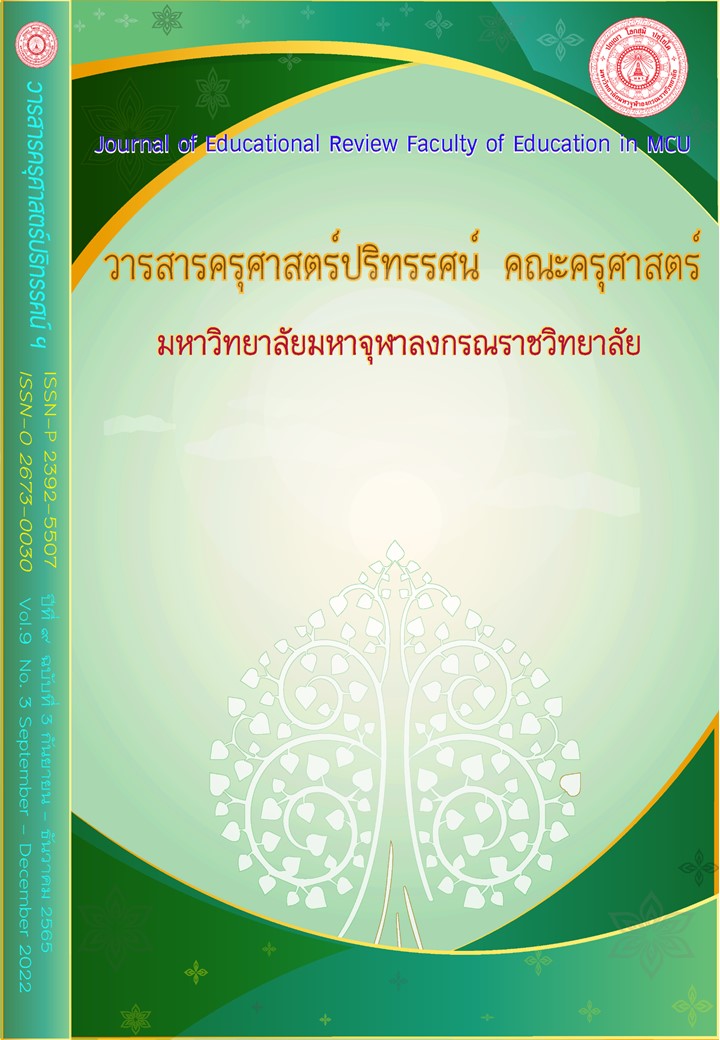A NEEDS ASSESSMENT OF DEVELOPING MANAGEMENT TOWARD EXCELLENCE UNDER THE BANGKOK METROPOLITAN ADMINISTRATION BASED ON MEDIA, INFORMATION AND DIGITAL LITERACY
Main Article Content
Abstract
The purpose of this study was to study a need assessment of developing management toward excellence under the Bangkok Metropolitan administration based on media, information and digital literacy, using descriptive analysis. The population was elementary school under the Bangkok Metropolitan administration consisted of 328 schools. The informants were the school administrators, the teachers work in the school’s quality assurance department, the students who studying grade 6, totally 543 people. The research instrument was a questionnaire on need assessment of the Bangkok Metropolitan administration based on media, information and digital in which the implemented statistic features were frequency distribution, percentage, mean, standard deviation and PNIModified. The results of the research revealed as follow: 1) The highest priority needs for school developing toward excellence in schools under the Bangkok Metropolitan Administration based on media, information and digital literacy in aspects of results was workforce (PNIModified = 0.173). The highest priority needs for school developing toward excellence in schools under the Bangkok Metropolitan Administration based on media, information and digital literacy in aspects of process considered by the order of need index as follow: 1) students and stakeholders 2) evaluation, analysis and knowledge management and developing performance 3) strategies 4) organization leading and 5) workforce. The highest priority needs of the sub-elements of Students and Stakeholders is Students and Stakeholders engagement to enhancing student to create media information and digital literacy (PNIModified = 0.181).
Article Details

This work is licensed under a Creative Commons Attribution-NonCommercial-NoDerivatives 4.0 International License.
ทัศนะและความคิดเห็นที่ปรากฏในบทความในวารสารฉบับนี้ถือเป็นความรับผิดชอบของผู้เขียนบทความนั้นเพียงผู้เดียว และไม่ถือเป็นทัศนะและความรับผิดชอบของกองบรรณาธิการ
กองบรรณาธิการขอสงวนสิทธิ์ในการคัดเลือกบทความลงตีพิมพ์และจะแจ้งให้เจ้าของบทความทราบหลังจากผู้ประเมินบทความตรวจอ่านบทความแล้ว
ต้นฉบับที่ได้รับการตีพิมพ์ในวารสารครุศาสตร์ปริทรรศน์ คณะครุศาสตร์ มหาวิทยาลัยมหาจุฬาลงกรณราชวิทยาลัย ถือเป็นกรรมสิทธิ์ของคณะครุศาสตร์ มหาวิทยาลัยมหาจุฬาลงกรณราชวิทยาลัย ห้ามนำข้อความทั้งหมดหรือบางส่วนไปพิมพ์ซ้ำ เว้นเสียแต่ว่าจะได้รับอนุญาตจากมหาวิทยาลัยฯ เป็นลายลักษณ์อักษร
References
ฐาปณัฐ อุดมศรี. (2558). รูปแบบการบริหารโรงเรียนเพื่อเสริมสร้างชุมชนแห่งการเรียนรู้ทาง วิชาชีพด้านการวิจัยปฏิบัติการในชั้นเรียน. ดุษฎีนิพนธ์ครุศาตรดุษฎีบัณฑิต, จุฬาลงกรณ์มหาวิทยาลัย.
นิธิดา แสงสิงแก้ว และนันทิยา ดวงภุมเมศ. (2563). แนวทางการสร้างสังคมเท่าทันสื่อ สารสนเทศ และดิจิทัล เมื่อ “เมืองทั่วถึง” เป็นได้ทั้ง “สื่อ” และ “สาร” เพื่อสร้างการเปลี่ยนแปลง. วารสารศาสตร์. 13(1). 135 – 159.
มูลนิธิส่งเสริมสื่อเด็กและเยาวชน. (2559). รอบแนวคิดพลเมืองประชาธิปไตยเท่าทันสื่อ สารสนเทศ และดิจิทัล Child Media. แหล่งที่มา https://www.childmedia.net/archives/205 สืบค้นเมื่อ 19 ต.ค. 2563.
เลขาธิการสภาการศึกษา. (2562). กรอบสมรรถนะหลักผู้เรียนระดับการศึกษาขั้นพื้นฐานและระดับประถมศึกษาตอนต้น (ป.1 - 3). กรุงเทพมหานคร: 21 เซนจูรี่.
วิชัย วงษ์ใหญ่ และมารุต พัฒผล. (2560). กระบวนทัศน์การโค้ชเพื่อเสริมสร้างทักษะการสร้างสรรค์และนวัตกรรม. กรุงเทพมหานคร: จรัลสนิทวงศ์การพิมพ์.
สำนักงานยุทธศาสตร์การศึกษา สำนักการศึกษากรุงเทพมหานคร. (2563). วิสัยทัศน์ พันธกิจ ยุทธศาสตร์ เป้าประสงค์. แหล่งที่มา http://www.bangkok.go.th/bangkokeducation/page/sub/10118/วิสัยทัศน์/พันธกิจ/ยุทธศาสตร์/เป้าประสงค์ สืบค้นเมื่อ 20 ต.ค. 2563.
สำนักการศึกษา กรุงเทพมหานคร. (2558). รายงานการวิจัย เรื่องแนวทางการพัฒนาเทคโนโลยีเพื่อการเรียนการสอนในโรงเรียนสังกัดกรุงเทพมหานคร. แหล่งที่มา http://www.bangkok.go.th/upload/user/00000116/4-techno/maew/vijai/resche.pdf สืบค้นเมื่อ 30 ม.ค. 2564.
สำนักการศึกษา กรุงเทพมหานคร. (2563). แผนพัฒนาการศึกษาขั้นพื้นฐาน กรุงเทพมหานคร ฉบับที่ 3 (พ.ศ.2564 - 2569). แหล่งที่มา https://drive.google.com/drive/folders/1jgGQEFkrRdAFuLJObo3FRrI70KCGyR_l. สืบค้นเมื่อ 31 ม.ค. 2564.
สำนักงานคณะกรรมการการศึกษาขั้นพื้นฐาน. (2559). เกณฑ์รางวัลคุณภาพ แห่งสำนักงานคณะกรรมการการศึกษาขั้นพื้นฐาน OBECQA ปี 2559 – 2560. กรุงเทพมหานคร: สำนักพิมพ์ชุมนุมสหกรณ์การเกษตรแห่งประเทศไทย.
สำนักงานเลขาธิการสภาการศึกษา. (2562). แนวทางการพัฒนาสมรรถนะผู้เรียน ระดับการศึกษาขั้นพื้นฐาน. กรุงเทพมหานคร: 21 เซ็นจูรี่.
อุษา บิ้กกิ้นส์. (2559). เด็กไทยกับการรู้เท่าทันสื่อใหม่. BMA กรุงเทพมหานคร. แหล่งที่มา http://www.bangkok.go.th/upload/user/00000116/4-techno/article/1-academic/14.pdf. สืบค้นเมื่อ 20 ต.ค. 2563.
Internet World Stats. (2020). World Internet Users and 2020 Population Stats. From https://www.internetworldstats.com/stats.htm. Retrieved January, 15, 2021.
Kuczmarski. (2016). Innovation Culture. From http://www.kuczmarski.com/liveit/. Retrieved April, 20, 2021.
Maslow, A. H. (1970). Motivation and personality. 2nded. New York: Harper & Row.
National Science and Technology Development Agency. (2015). Digital literacy. From https://www.nstda.or.th/th/nstdaknowledge/142-knowledges/2632.Retrieved January, 10, 2021.
Scott, E. (2001). Northern California School Superintendents, Perceptions Regarding
Conflicts with Board Member in the Area of Human Resource Administration. Doctoral dissertation thesis, University of La verne.
Silver, A. (2009). A European Approach to Media Literacy: Moving toward an Inclusive Knowledge Society. Comunicar Journal 32: Mapping Media Education. Policies in the world. 16.
Taro Yamane. (1973). Statistics: An Introductory Analysis. 3rd ed. New York: Harper and Row Publications.


